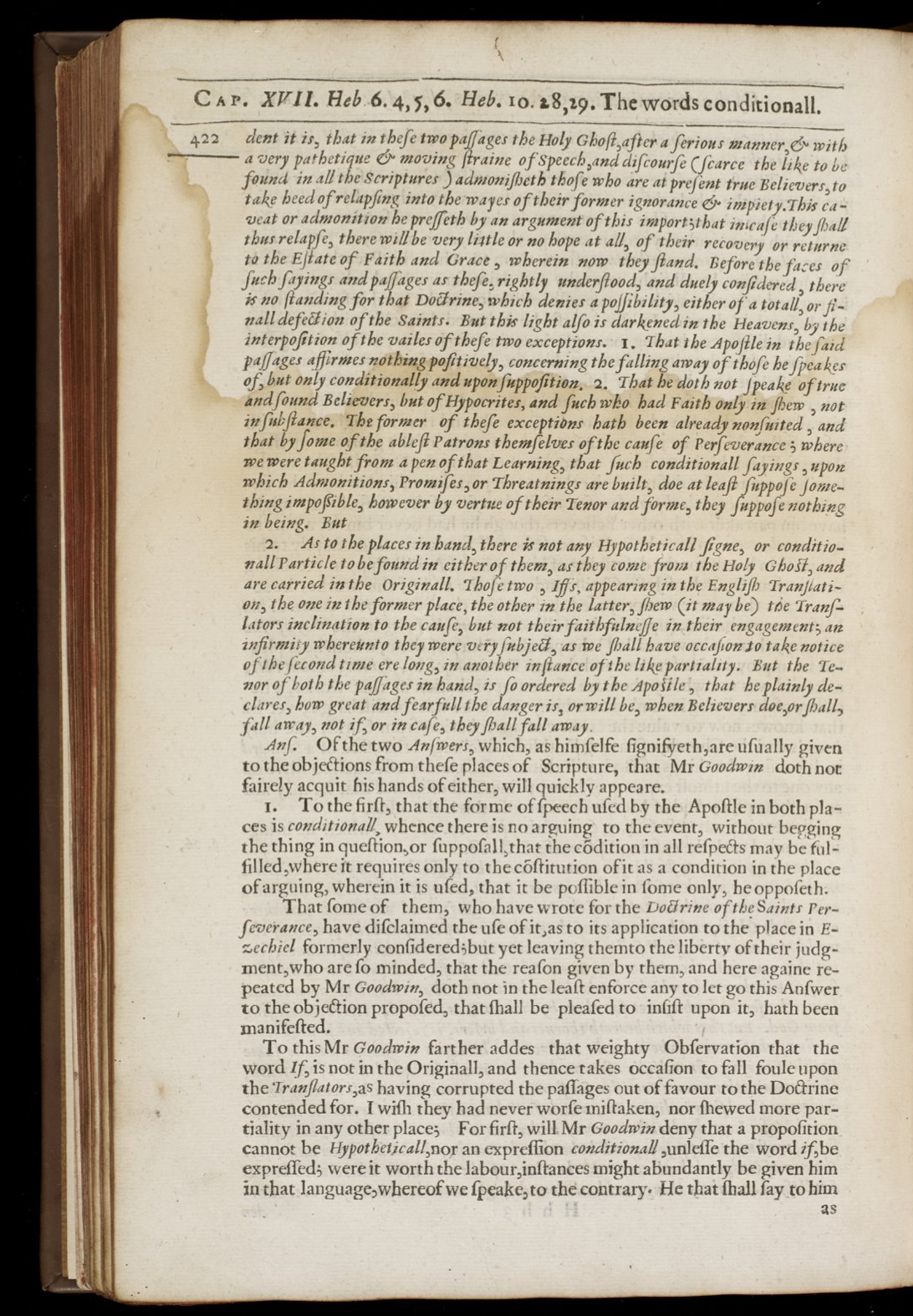

C
A
P.
XVII.
,Heb.
6.4,
5,
6.
Heb.
r
o.
a
8,29.
The
words conditionall.
422
dent
it
is,
that in
thefe
two paffages
the
Holy
Ghofl,after
a
ferious manner,&
with
a
very
pathetique
&
moving
graine
ofspeech,and
difcourfe
(fcarce
the like
to
be
founel
in
all the
Scriptures
)
admonifbeth thole
who
are at prefent true
Believers, to
take
heed
ofrelapfng
into
the
wayes
of
theirformer
ignorance
&
impiety.This
ca-
veat
or
admonition
he
preffeth
by
an argument
of
this
import
;that
inicaf
è
they
(hall
thusrelapfe,
there will
be
very
little
or
no
hope
at
all,
of
their
recovery
or
retorno
to
the Efiate
of
Faith and
Grace
,
wherein
now they
fland.
Before
the
faces
of
filchfayings and
paffages
as
thefe,
rightly
underfiood,
and
duely
confîdered,
there
is
no
landing
for
that
Daririne,
which denies
a
poJbility,
either
of
a totali,
or
fi'
nail
defeblion
of
the Saints.
But
this
light
alfo
is darkened in the
Heavens,
by
the
interpofition
of
the
vailes
of
theft
two
exceptions.
i.
That the
Apofile
in
the
faid
paffages a
f
rmes
nothing
pofttively, concerning
the
filling
away
of
thole
he
fpeaker
of,
but
only
conditionally
and
uponfuppofttion, 2.
That
he
doth
not
Jpeake
of
trite
andfound
Believers, but
of
Hypocrites,
and fuck
who
had Faith
only
in
Phew
not
infubfante.
The
former
of
theft
exceptibns
bath
been
already
nonfuited, and
that
by
fome
of
the
ablefi
Patrons
themfelves
of
the caufe
of
Perfeverance
;
where
we were
taught
from
a pen
of
that
Learning,
that
fuch
conditionall
fayings,
upon
which Admonitions, Promifes,
or
Threatnings are
built,
doe
at
leafs
fuppofe
fome-
thing
impopible, however
by
vertue
of
their
Tenor
and
forme,
they fuppofe
nothing
in
being. But
2. As to
the
places
in hand,
there
is
not any Hypotheticall
fgne,
or conditio-
nall
to
be
found in
either
of
them,
as
they
come
from
the
Holy
Ghofl,
and
are carried in the Originall.
Thof
e
two
,
Iffs, appearing
in
the
Englifh
Tranjlati-
on, the
one
in
the former
place,
the other in the
latter,
(hew
(it
may
be)
tie
Tranf
lators
inclination
to the caufe, but
not theirfaithfulneffe in their
engagement;
an
infirmity
whereunto
theywere
veryfubje/,
as
we
(hall
have occafionto
tale
notice
of
the
fecond time erelong, in another in
fiance
of
the like
partiality.
But the Te-
nor
of
both
the
paffáges
in
hand,
is
fo
ordered
by
the Apofile,
that
heplainly
de
clares,
how
great and
fearfull
the danger is, or
will
be, when
Believers
doe,or
(hall,
fall
away, not
if,
or
in
cafe,
they
(ball
fall
away.
Anf.
Of
the two
Anfwers,
which,
as
himfelfe
fignifyeth,are ùfually given
to
the
obje&ions from
thefe
places
of
Scripture,
that
Mr
Goodwin
cloth
not
fairely acquit
his
hands
of
either,
will
quickly appeare.
t.
To
the
firft,
that
the forme
of
fpeech ufed by
the
Apofile in
both pla-
ces
is
conditionall whence
there
is
no
arguing
to
the
event, without-begging
the thing
in
queflion,or fuppofall,that
the cödition
in
all
refpe&s
may
be
fill=
filled,where it requires
only
to
the
cöftitution
of
it
as a
condition
in
the
place
of
arguing, wherein it
is
ufed,
that
it
be poffible
in
Tome
only,
he oppofethc
That
fome
of
them,
who have
wrote
forthe
Dolrine
of
the
Saints
Per
-
feverance,
have
difclaimed the ufe
of
it,as
to
its
application
to
the
place
in
E-
zechiel
formerly confidered;but yet leaving
themto the liberty
of
their judg-
nient,who are
fo
minded,
that
the
reafon given by
them, and here
againe
re-
peated byMr
Goodwin,
doth not
in
the
leaf}
enforce
any
to
let go
this Anfwer
to
theobje
&ion
propofed,
that
thall
be pleafed
to
infift
upon
it,
bath
been
manifefted.
To
this Mr
Goodwin
farther
addes
that
weighty Obfervation
that the
word If,
is
not
in
the
Original], and thence
takes
occafion
to
fall foule upon
the
Tranflators,as
having
corrupted
the
paffages
out
of
favour
to
the Do
&rine
contended for.
I
with
they
had never worfe miftaken,
nor
(hewed
more
par-
tiality
in
any
other
place;
For
firft.,
will.
Mr
Goodwin
deny
that
a
propofition.
cannot be
Hypotheticall,nor an
expreffion
conditionall
,unl
effe
the word
if,be
exprefíed; were it
worth the
labour,inftances might
abundantly be
given him
in
that
language,whereof
we
fpeake,to the
contrary. He
that
(hall fay
to
him
as










